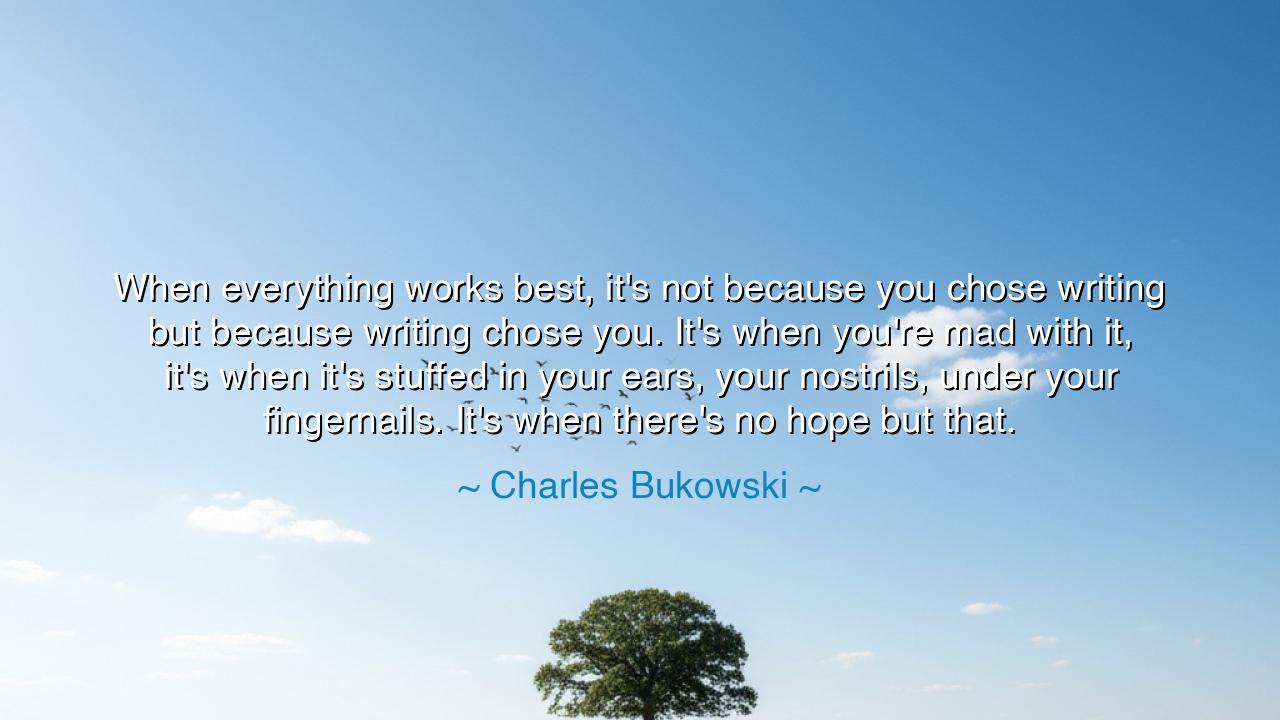
When everything works best, it's not because you chose writing
When everything works best, it's not because you chose writing but because writing chose you. It's when you're mad with it, it's when it's stuffed in your ears, your nostrils, under your fingernails. It's when there's no hope but that.






“When everything works best, it's not because you chose writing but because writing chose you. It's when you're mad with it, it's when it's stuffed in your ears, your nostrils, under your fingernails. It's when there's no hope but that.” Thus spoke Charles Bukowski, the rough prophet of the modern age, whose pen bled the truth of the streets and the solitude of the human soul. These words are not merely about writing, but about calling—the sacred madness that drives a person to creation, to labor not for fame or fortune, but because the act itself is as necessary as breathing. In this declaration, Bukowski reveals the fire that burns in all true creators: that the greatest art, the truest work, does not come from choice, but from possession. One does not decide to create—it is creation that decides upon you.
Bukowski, who lived among poverty, drink, and despair, was not a man of polished surfaces. His life was a war between survival and the urge to write. He worked in post offices and factories, enduring long hours of drudgery, but through it all, words haunted him like an obsession. He wrote not for pleasure, but because he could not not write. This is the essence of his quote: when one is chosen by the craft, it invades every corner of being—it fills the lungs like air, it clings beneath the skin, it whispers in the night. The true artist is not free from their art; they are its vessel, its prisoner, and its instrument.
This state of being “mad with it,” as Bukowski calls it, is not reserved for writers alone. It is the same divine madness that consumed Beethoven, who composed symphonies even after losing his hearing; that drove Michelangelo, who painted the ceiling of the Sistine Chapel with bleeding fingers and sleepless eyes; that filled Van Gogh, who painted light even while drowning in darkness. To be possessed by one’s art or purpose is both agony and grace. It is to live in continual tension between destruction and creation, to be tormented by the very gift that gives your life meaning. Yet it is precisely this torment that brings forth beauty, the kind that cannot be faked or feigned.
The ancients spoke of such fire as divine inspiration—what the Greeks called mania, a sacred frenzy granted by the Muses. The poet Homer, they said, was blind not by misfortune, but because his inner sight was too radiant for mortal eyes. Likewise, Bukowski’s vision came not from comfort but from chaos. He knew that when one’s art “works best,” it is not through intellect or will, but through surrender—when the self dissolves, and the work flows through the creator as if from some higher source. The artist becomes a conduit, and in that surrender lies both power and peace.
But this surrender comes with a price. Bukowski warns that there is “no hope but that”—meaning that once the flame of passion takes hold, all other paths seem dull and hollow. The one chosen by their calling cannot find rest in ordinary pursuits. They may try to flee, to live a quieter life, but the calling will find them again, whispering, haunting, demanding. This is both the tragedy and the triumph of the devoted life: to be consumed by a purpose so fierce that nothing else can satisfy. For some, it leads to greatness; for others, to ruin. Yet even ruin, when born of devotion, holds a kind of immortality.
In these words, Bukowski also offers a mirror to the modern soul—so easily distracted, so easily dulled by comfort. He reminds us that true mastery comes not from convenience, but from compulsion. Whether one’s calling is art, teaching, healing, or service, the same law applies: the work must become one’s breath and blood. It must demand everything. Only then can it become something eternal—something that bears the mark of truth. In an age that prizes ease and instant recognition, Bukowski’s words burn like a challenge: Do you love your craft enough to suffer for it? To let it devour you, remake you, define you?
And so, O seeker of meaning, take heed of this truth: greatness is not chosen—it chooses. If there is something that calls to you, that refuses to leave your mind, that presses upon your heart like a weight, do not ignore it. Welcome it, even when it hurts, even when it isolates you. For that is the voice of your purpose. Let it fill your nostrils, your fingertips, your nights and your waking hours. Let it drive you to madness and then to clarity. Because when everything works best, it will not be because you forced your destiny, but because destiny itself found you ready.
Thus, live not as one who merely works, but as one who is chosen by the work. Let passion be your torment and your liberation. For in that sacred fire—in that unbearable and beautiful obsession—you will find not just creation, but yourself.






AAdministratorAdministrator
Welcome, honored guests. Please leave a comment, we will respond soon